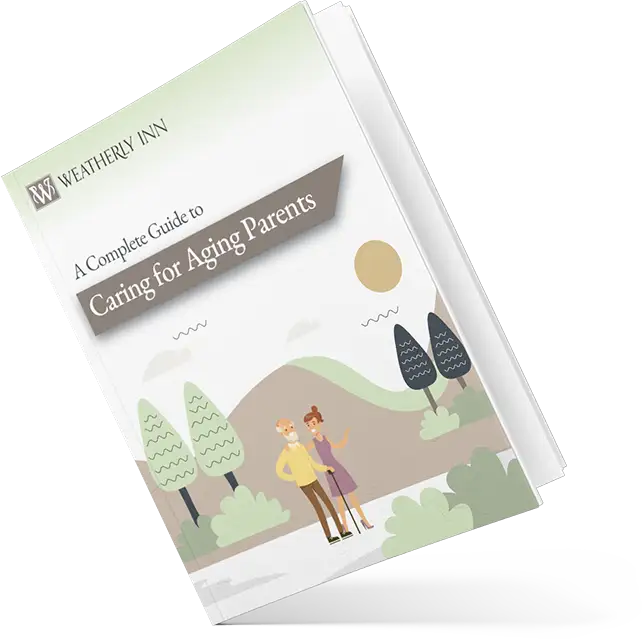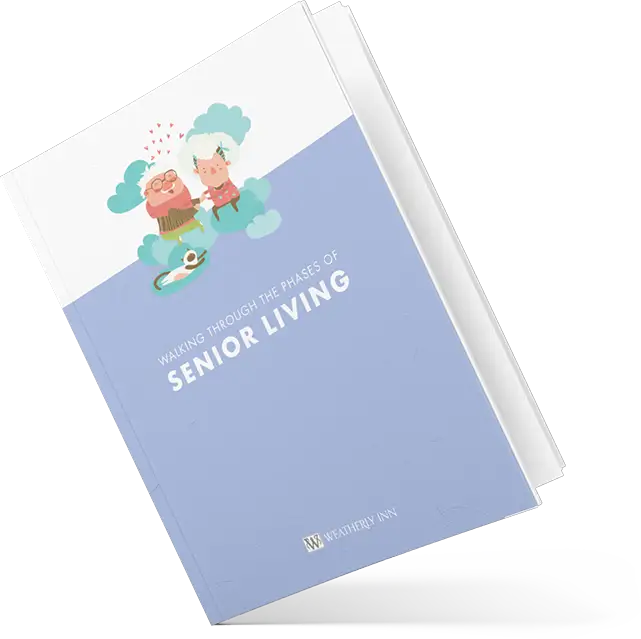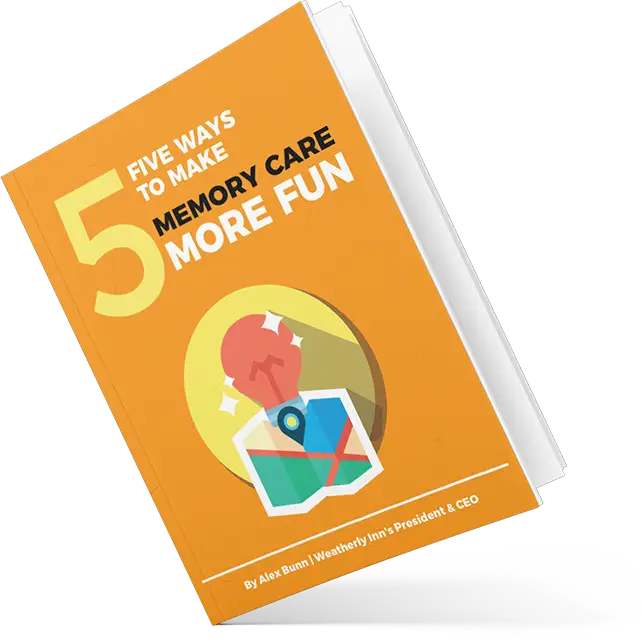November 4, 2020
Caring for an aging parent is incredibly rewarding. It also can be stressful, expensive, and time-consuming. So we’ve put together a checklist to help you provide a high quality of life to your elderly parent.
The terms caregiver and caretaker are sometimes used interchangeably in the elder-care world. However, as long-time senior care professionals at Weatherly Inn, we have noticed that over time, unhealthy relationships can develop between family caretakers and their “patients.”
Today, we’re going to delve deeper into the difference between these two types of care providers, with a specific focus on the emotional well-being of both seniors and their family members. We’ll define the differences between caregivers and caretakers, and we’ll explore some side effects of long term stress associated with caregiving. We’ll also help you identify unhealthy, co-dependent relationships that sometimes emerge in caregiving situations.
Let’s start with a look at semantics.
Thinking About Wordplay — Being a Caregiver vs. a Caretaker
An etymologist would note that everywhere outside North America, caretakers are employed to take care of places and things — schools, summer homes, and cemeteries come to mind. Caretakers perform routine janitorial services, ensure a building is secure, and mow the lawn. Sometimes the caretaker lives on site. There’s nothing interpersonal about the job.
- Only in newer North American English dialects do we use the term “caretaker” to describe the duties better associated with the more recent concept of “caregiver.”
To clarify, caregivers — whether they are part-time employees, visiting professionals from a home-care agency, or a related family member — provide personal services for elderly and disabled individuals. Their duties generally include grocery shopping, medication management, transportation to medical appointments, meal preparation, and companionship, to name a few.
Lawn-mowing and landscaping are generally not involved.
- Still, languages evolve. While there’s nothing grammatically incorrect about the term caretaker in North American English, it does have specific psychological and emotional implications.
It’s our experience that self-described caregivers provide a meaningful service for older adults and a level of care while setting personal boundaries. Contrastingly, self-described caretakers tend to build unhealthy, controlling or co-dependent relationships with their “patients.”
Let’s examine how the terms caregiver and caretaker can carry strong implications among elderly individuals.
Caregiver vs. Caretaker
What Caregivers Do
Notice the giver portion of the term. Caregivers are thought of as:
- Giving
- Caring
- Thoughtful
- Kind
- Responsible and responsive to the personal needs of their aging family member or client
What Caretakers Do
Now, notice the taking portion of this term. Aging Americans might have negative feelings about this word. To them, it sounds like caretakers could take control of all aspects of another person’s life as if they have no agency.
The term caretaker can imply that the senior is unable to care for themselves at all. Some seniors fear that a caretaker might:
- Insist on being in charge of finances, banking or estate issues.
- Make decisions based on a co-dependency or “ownership” of the person they’re helping (more on that in a moment).
- Or become meddlesome in the private affairs of the senior.
On Caretakers and Codependency
While many individuals caring for elderly parents or other loved ones can provide excellent care and preserve a healthy relationship, the stress and responsibilities family caretakers face can sometimes create unhealthy behaviors and relationships with the senior family member. If this happens, it usually starts with the best intentions, but prolonged stress and exhaustion, and caregiver fatigue can exacerbate already strained situations. Caregivers may become emotionally over-involved in personal care and emotionally overwhelmed.
Codependency
The Mental Health America website defines codependency as “an emotional and behavioral condition that affects an individual’s ability to have a healthy, mutually satisfying relationship.” It’s sometimes called “relationship addiction” because people with codependency seek to form or maintain one-sided, emotionally destructive, and potentially abusive relationships.
In our experience, caretakers in addiction recovery (it doesn’t matter which substance) are most likely to succumb to an unhealthy caretaking situation.
How Codependent Relationships Cultivate Among Family Caretakers
Co-dependency among caregivers/caretakers may arise from an entirely innocent situation. For instance, it could begin when an elderly family member needs some help with basic tasks around the home and activities of daily living (ADLs). A family member volunteers to help their senior loved one, and begins to lose themselves into “over caring.”
- Sometimes the senior family member encourages a co-dependent situation.
- They may offer cash, gas money, or a living situation in return for constant company.
Co-dependence, also called “enabling,” is doing for someone what they should be doing for themselves, allowing (enabling) them to continue inappropriate behavior. When you enable, you are over caring.
This codependency can become a source of extreme stress for caretakers. It causes irritability, anger, excess work, and critical and guilty feelings toward ourselves, not to mention fights, conflicts and confrontations with relatives over a family member’s care. In short, codependent behavior is toxic to the surrounding family.
Seeing Caregiver/Caretaker Codependency
Dysfunctional, one-sided relationships characterize Codependency. It’s sometimes called “enabling.” One person relies on the other to meet most of their emotional needs. They’re also allowed to maintain irresponsible, addictive and underachieving behavior. In addition to caretaking/caregiving situations, families dealing with alcoholism often have these kinds of relationships.
- Co-dependent behaviors are learned by watching and imitation.
- The disorder was first identified after years of studying families of alcoholics.
How Healthy Caregiving Becomes Unhealthy Caretaking
Many relationships between a caregiver and their loved one are strong and compassionate. Sometimes, stressful situations can lead to less healthy caregiving. If this happens, it doesn’t necessarily mean they love the person they’re caring for any less. Even if a caregiver doesn’t have another job, the pressure of caring for an aging parent, grandparent or spouse can simply be too much.
- Caretakers start to place excessive stress on themselves to perform tasks on behalf of their family member — whether their loved one needs this help or not.
- They become overwhelmed with feelings of inadequacy if they can’t handle some tasks for their loved one — like filing their family member’s income taxes — even if there are low-cost professional services available.
- Once a caretaker is overwhelmed, the elderly loved one’s other needs suffer. Over-concerned and absorbed with the complexities of filing the family member’s taxes, they may start to neglect things like medication management or nutrition.
- This can directly and immediately affect the senior’s well-being, leading the caretaker on a downward spiral of feelings of inadequacy and stress.
Other family members and acquaintances begin to notice and make comments or offer help. A codependent caretaker doesn’t want help (that would equate to a loss of control or glaring example of their inadequacy). They become rude, even physically combative, rather than accepting of help.
Signs Your Senior Family Member Needs Other Help
Meeting your senior family member’s healthcare needs every day, and sometimes several times a day, requires many hours of care. If they need assistance with activities of daily living –– like bathing, eating, dressing and toileting –– a family caregiver can help until the point they become overwhelmed. You want to keep your loved one in their own home as long as possible, and you may have reservations about a nursing home. But this is when it might be time to consider an assisted living community or live-in home health care. If you do go the home caregiver route, be sure to do proper background checks. In-home care can also be costly, so compare hourly rates and the care services that they’ll provide. You can also check to see if Medicaid will cover any costs of care needs or an assisted living facility.
Health problems and signs that your loved one needs professional medical care include:
- Wandering, which is common among Alzheimer’s Disease and dementia patients
- Rapid weight loss
- Missed doctor’s appointments or missed medication pickups
- Changing social habits — a senior who often attended worship services suddenly stops.
- Increased confusion
- Unopened mail, or bills not getting paid
- Mysterious bruises
- An unkempt appearance, dirty clothing or neglected grooming
At Weatherly Inn, we realize that caregiving is incredibly stressful and time-consuming. We also know it can quickly become challenging for many would-be home caregivers to adequately provide full-time care, even if they have the best intentions! You may be intimidated by the cost of care, but we can help you explore various financing options to help make an assisted living facility more feasible.
Our communities provide many types of care and senior living options and peace of mind for you. A home caregiver can provide many care services, but nothing compares to the level of care our staff provides. We invite you to explore all our care options for older people on our website. If you’d like to speak with us about assisted living or day and respite care for seniors in Washington, please get in touch. We’d love to give you a no-pressure, no-cost consultation to talk about your loved one’s long-term care needs.
Related Reading & Resources:
PAStairlifts.com: Caregiver vs Caretaker: Which is Correct for Elder Care?
Grammarphobia.com: How Did a “Caretaker” Become a “Caregiver”



